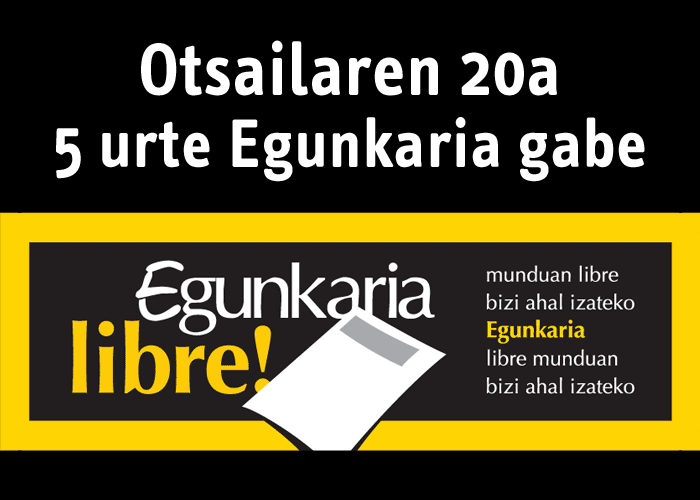|
Egin (newspaper)
''Egin'' was a Basque newspaper written in Spanish language and Basque language. Founded in 1977 the paper was in circulation until 1998 when it was closed down by the Spanish government. History and profile The first issue of ''Egin'' was published on 29 September 1977. The paper was published from Hernani by Orain SA, which also ran the radio station Egin Irratia. In 1993 its circulation was 51,366 copies. The publication was a major driving force behind Basque Radical Rock, releasing in 1987 the compilation ''Bat, Bi, Hiru... Hamar'', considered a watershed in that musical movement. For many years ''Egin'' was accused of being used by the separatist organization Euskadi Ta Askatasuna (ETA). One of its editors-in-chief was Josu Muguruza, a politician from Herri Batasuna, who was assassinated on 20 November 1989. In 1985, the editor Xabier Galeano was killed by the death squads GAL in the context of the 'dirty war'. In 1994, the Ertzaintza (Basque police) searched the headqu ... [...More Info...] [...Related Items...] OR: [Wikipedia] [Google] [Baidu] |
Basque People
The Basques ( or ; eu, euskaldunak ; es, vascos ; french: basques ) are a Southwestern European ethnic group, characterised by the Basque language, a common culture and shared genetic ancestry to the ancient Vascones and Aquitanians. Basques are indigenous to, and primarily inhabit, an area traditionally known as the Basque Country ( eu, Euskal Herria) — a region that is located around the western end of the Pyrenees on the coast of the Bay of Biscay and straddles parts of north-central Spain and south-western France. Etymology The English word ''Basque'' may be pronounced or and derives from the French ''Basque'' (), itself derived from Gascon ''Basco'' (pronounced ), cognate with Spanish ''Vasco ''(pronounced ). Those, in turn, come from Latin ''Vascō'' (pronounced ; plural '' Vascōnes''—see history section below). The Latin generally evolved into the bilabials and in Gascon and Spanish, probably under the influence of Basque and the related Aquitani ... [...More Info...] [...Related Items...] OR: [Wikipedia] [Google] [Baidu] |
José María Aznar
José María Alfredo Aznar López (; born 25 February 1953) is a Spanish politician who was the prime minister of Spain from 1996 to 2004. He led the People's Party (PP), the dominant centre-right political party in Spain. A member of the Frente de Estudiantes Sindicalistas, a dissident Falangist student organisation, in his youth, he studied law at the Complutense University of Madrid and first worked in the public sector as an Inspector of the Finances of the State ( es, Inspector de las Finanzas del Estado). He joined the Popular Alliance, which was re-founded as the People's Party in 1989. He led the Junta of Castile and León from 1987 to 1989 and was Leader of the Opposition at the national level from 1989 to 1996. In 1995, he survived an assassination attempt from the Basque separatist group ETA. The People's Party, led by Aznar, won the most parliamentary seats at the 1996 general election, but he failed to obtain a majority in the Congress of Deputies, which forced ... [...More Info...] [...Related Items...] OR: [Wikipedia] [Google] [Baidu] |
Defunct Newspapers Published In Spain
{{Disambiguation ...
Defunct (no longer in use or active) may refer to: * ''Defunct'' (video game), 2014 * Zombie process or defunct process, in Unix-like operating systems See also * * :Former entities * End-of-life product * Obsolescence Obsolescence is the state of being which occurs when an object, service, or practice is no longer maintained or required even though it may still be in good working order. It usually happens when something that is more efficient or less risky r ... [...More Info...] [...Related Items...] OR: [Wikipedia] [Google] [Baidu] |
Publications Disestablished In 1998
To publish is to make content available to the general public.Berne Convention, article 3(3) URL last accessed 2010-05-10.Universal Copyright Convention, Geneva text (1952), article VI . URL last accessed 2010-05-10. While specific use of the term may vary among countries, it is usually applied to text, images, or other audio-visual content, including paper ( |
Newspapers Established In 1977
A newspaper is a periodical publication containing written information about current events and is often typed in black ink with a white or gray background. Newspapers can cover a wide variety of fields such as politics, business, sports and art, and often include materials such as opinion columns, weather forecasts, reviews of local services, obituaries, birth notices, crosswords, editorial cartoons, comic strips, and advice columns. Most newspapers are businesses, and they pay their expenses with a mixture of subscription revenue, newsstand sales, and advertising revenue. The journalism organizations that publish newspapers are themselves often metonymically called newspapers. Newspapers have traditionally been published in print (usually on cheap, low-grade paper called newsprint). However, today most newspapers are also published on websites as online newspapers, and some have even abandoned their print versions entirely. Newspapers developed in the 17th century, as ... [...More Info...] [...Related Items...] OR: [Wikipedia] [Google] [Baidu] |
1998 Disestablishments In Spain
1998 was designated as the ''International Year of the Ocean''. Events January * January 6 – The '' Lunar Prospector'' spacecraft is launched into orbit around the Moon, and later finds evidence for frozen water, in soil in permanently shadowed craters near the Moon's poles. * January 11 – Over 100 people are killed in the Sidi-Hamed massacre in Algeria. * January 12 – Nineteen European nations agree to forbid human cloning. * January 17 – The ''Drudge Report'' breaks the story about U.S. President Bill Clinton's alleged affair with Monica Lewinsky, which will lead to the United States House of Representatives, House of Representatives' impeachment of him. February * February 3 – Cavalese cable car disaster (1998), Cavalese cable car disaster: A United States military pilot causes the deaths of 20 people near Trento, Italy, when his low-flying EA-6B Prowler severs the cable of a cable-car. * February 4 – The 5.9 February 1998 Afghanistan earthquake, Afghanis ... [...More Info...] [...Related Items...] OR: [Wikipedia] [Google] [Baidu] |
1977 Establishments In Spain
Events January * January 8 – 1977 Moscow bombings, Three bombs explode in Moscow within 37 minutes, killing seven. The bombings are attributed to an Armenian separatist group. * January 10 – Mount Nyiragongo erupts in eastern Zaire (now the Democratic Republic of the Congo). * January 17 ** 49 marines from the and are killed as a result of a collision in Barcelona harbour, Spain. * January 18 ** Scientists identify a previously unknown Bacteria, bacterium as the cause of the mysterious Legionnaires' disease. ** Australia's worst Granville rail disaster, railway disaster at Granville, a suburb of Sydney, leaves 83 people dead. ** SFR Yugoslavia Prime minister Džemal Bijedić, his wife and 6 others are killed in a plane crash in Bosnia and Herzegovina. * January 19 – An Ejército del Aire CASA C-207 Azor, CASA C-207C Azor (registration T.7-15) plane crashes into the side of a mountain near Chiva, Valencia, Chiva, on approach to Valencia Airport in Spain, killing all ... [...More Info...] [...Related Items...] OR: [Wikipedia] [Google] [Baidu] |
Egunkaria
''Egunkaria'' (Basque for ''The Daily'') for thirteen years was the only fully Basque language newspaper in circulation until it was closed down on 20 February 2003 by the Spanish authorities due to allegations of an illegal association with ETA, the armed Basque separatist group. After seven years, on 15 April 2010 the defendants were acquitted on all charges related to ties to ETA. The issue of damages for the closure of the newspaper (which no longer operates) remains open, as well as the alleged torture of the members of the newspaper's executive board during detention. History and profile ''Egunkaria'' was established in 1990 as the only Basque-language daily newspaper in the Basque Country (there had already been bilingual newspapers and monolingual weeklies). The founders initially expected, when launched in 1990, to reach a circulation of 8,000 to 15,000 copies and 40,000 potential readers, a goal later achieved, later growing into a widely respected publication as we ... [...More Info...] [...Related Items...] OR: [Wikipedia] [Google] [Baidu] |
Gara
''Gara'' (Basque: ''We Are'') is a bilingual (Basque/Spanish) newspaper published in the city of Donostia-San Sebastián in the Basque Autonomous Community. The newspaper's target market comprises the area of the Basque Country, but its circulation is largely constrained to the Southern Basque territory (Spain), since Spanish is mainly used. Gara, the third most-read newspaper in the Basque Autonomous Community and Navarre, was first published on 30 January 1999 as successor to the leftist and Basque nationalist newspaper ''Egin'', which had been shut down by the noted prosecuting judge Baltasar Garzón in a highly controversial move on 15 July 1998. The case was dismissed and defendants acquitted, with the final verdict stating that no illicit activity was engaged by Egin (2009). On 12 March 2004, ETA denied in a communique to Gara and the Basque public broadcaster EITB its involvement in the March 11, 2004 Madrid attacks. In July 2008, the newspaper denounced that it ... [...More Info...] [...Related Items...] OR: [Wikipedia] [Google] [Baidu] |
Ezker Abertzalea
Abertzale left ( eu, Ezker abertzalea, es, Izquierda abertzale; ) is a term used to refer to the parties or organizations of the Basque nationalist/separatist left, stretching from democratic socialism to communism. This leftist character is highlighted in contrast to the traditional '' jeltzale'' nationalism represented by the Basque Nationalist Party (EAJ-PNV), a conservative and Christian-democratic party, which has long been the largest in the Basque Country. The first examples of ''abertzale'' parties are the Basque Nationalist Republican Party (EAAE-PRNV), active from 1909 to 1913, and the Basque Nationalist Action (EAE-ANV), active from 1930 to 2008. They represented the non-confessional Basque nationalist references when ETA was formed in 1959 by younger generations. ''Ezker abertzalea'' (or, in Spanish, ''izquierda abertzale'') is notably used when referring to the leftist-nationalist environment of Batasuna, an outlawed political party. More recently, in 1986, a le ... [...More Info...] [...Related Items...] OR: [Wikipedia] [Google] [Baidu] |
Julio Anguita
Julio Anguita González (21 November 194116 May 2020) was a Spanish politician and historian. He was Mayor of Córdoba, Spain, Córdoba from 1979 to 1986, coordinator of United Left (Spain), United Left (IU) between 1989 and 1999, and Secretary-General of the Communist Party of Spain (PCE) from 1988 to 1998. Due to his influence and his absolute majorities in Córdoba, he was nicknamed ''el califa rojo'' (''the red Caliph''). Biography Anguita was born in Fuengirola, Province of Málaga, Málaga, on 21 November 1941, into a family with a military background, son of an army sergeant and grandson of a ''Guardia Civil, guardia civil''. He took teaching studies (''magisterio'') and later earned a degree in history at the University of Barcelona. Anguita, who had been a militant in Christian grassroots movements, joined the clandestine Communist Party of Spain (PCE) in 1972, when he already had obtained a post as teacher. Five years later he became a member of the Central Committee of ... [...More Info...] [...Related Items...] OR: [Wikipedia] [Google] [Baidu] |
United Left (Spain)
United Left ( es, Izquierda Unida , IU) is a federative political movement in Spain that was first organized as a coalition in 1986, bringing together several left-wing political organizations, most notably the Communist Party of Spain. IU was founded as an electoral coalition of seven parties, but the Communist Party of Spain (PCE) is the only remaining integrated member of the IU at the national level. Despite that, IU brings together other regional parties, political organizations, and independents. It currently takes the form of a permanent federation of parties. IU is currently part of the Unidas Podemos coalition and the corresponding parliamentary group in the Congreso de los Diputados. Since January 2020, it participates for the first time in a national coalition government, with one minister. History Following the electoral failure of the PCE in the 1982 (from 10% to 4%), PCE leaders believed that the PCE alone could no longer effectively challenge the electoral he ... [...More Info...] [...Related Items...] OR: [Wikipedia] [Google] [Baidu] |









